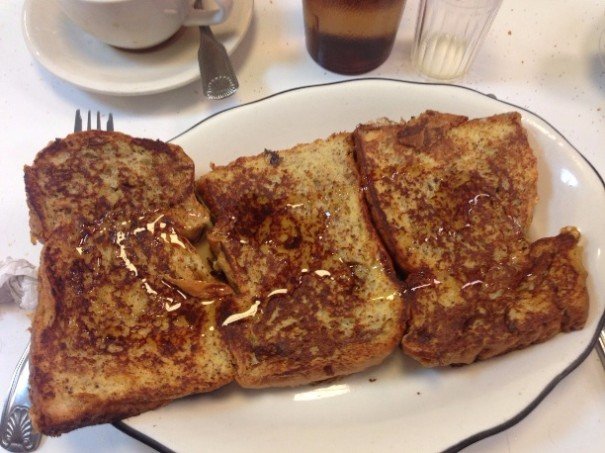
The New Old‑Fashioned New York Breakfast

The New Old‑Fashioned New York Breakfast
Challah French Toast in the East Village
New York’s diners enjoy cult followings, but few places inspire as much loyalty as the kosher eatery B&H Dairy, perched on Second Avenue’s “Borscht Belt” in the East Village. Open since 1942, the tiny diner serves hundreds of customers each day, with a menu of diner food and Ashkenazi Jewish classics: borscht and blintzes, pancakes and omelets, home fries and knishes. East Villagers spin tales of legendary meals there; New Yorkers around the world brighten at the mention of this humble little restaurant. In an era of kale juice cleanses and expensive toast, B&H is the reminder of an earlier, and heartier, New York breakfast.
So when a gas explosion down the block led to a five-month closure for the storied diner, customers—fans—were distraught. Many wondered if B&H would ever reopen; several crowdfunding efforts funded necessary repairs and operating expenses. Even then, the restaurant’s future was uncertain, and many alluded to the origin of the restaurant’s name, be’ezrat Hashem, “by the will of God,” to express their hope. Thus, when the eatery reopened in mid-August this year, a throng of excited neighborhood residents crowded around for the new first breakfast.
B&H’s breakfasts, traditional Ashkenazi Jewish cooking, and service are for many the vestiges of an earlier era. “Brunch,” a marker of élite status in New York among hipsters and yuppies, has hurt the famed diners; the breakfasts New York was once so known for are disappearing. Yet B&H holds onto its well-maintained simplicity: the eggs are delicious but not dressed up, the French toast served “plain” and without fuss. Reopened, the restaurant feels renewed, but the unpretentious cooking has remained the same.
What is the power of a plate of challah French toast? As I sit down on a Sunday morning in B&H for my first helping of the staple, I wonder, is it a reminder that there is something about a simple breakfast that is more organic, more authentic, but not in the way those words are used today? Is it that some socially induced memory of a New York past and Jewish East Side are brought to life when I take a bite? But I think, as I delight in the springiness of the egg-soaked bread against the crispy fried exterior, drowned in a proudly unreal maple syrup, that it is simply the feeling of being at home that such a food induces. This is why customers keep on coming back for homely eggs and toast; at the end of the day, this is what New Yorkers still crave at the beginning of the day.